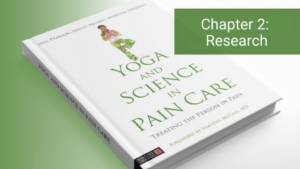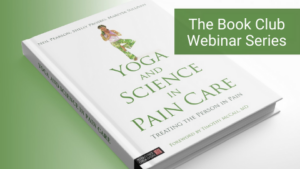
Yoga and Science in Pain Care: Book Club Webinar Series
2020-Oct-Wed @ 5:00 pm - 6:30 pm
| $39.99 Chapter 2: Current Research in Yoga and Pain
Chapter 2: Current Research in Yoga and Pain
In this session, Dr. Steffany Moonaz will present the recent trajectory of yoga research, the state of the research on yoga for pain and why yoga therapy research matters. It will also touch on general trends, limitations, and future directions of yoga research. The basic concepts of evidence-informed practice and its use in yoga therapy will be addressed, and a case study will be used to demonstrate the importance of research literacy and reporting transparency for stakeholders including yoga therapists and yoga therapy consumers.
To register for just for Chapter 2 with Dr. Moonaz, Shelly, Neil and Marlysa, CLICK HERE
This webinar is part of a larger webinar series. You can choose to register for individual sessions or you can register for the entire series at a discount.
The full book club webinar series consists of all 15 chapters.
Details and to sign up for the full bundle (best price option) CLICK HERE.
Learning Objectives for Chapter 2:
- Describe the general trend in yoga research over the last twenty years.
- List major strengths and challenges in yoga research related to chronic pain.
- Define evidence-informed practice and explain its relevance to yoga therapy.
Here is the description for the entire 15-part Book Club webinar series:
Are you looking for ways to better help people in pain? If you are, you’re not alone. It is estimated that over 1.5 billion people worldwide are affected by chronic pain. That’s 20.5% of the world population that is suffering and needs your help.
Join Neil Pearson, Shelly Prosko and Marlysa Sullivan, the co-editors of Yoga and Science in Pain Care, and 8 co-authors for the first-ever 15-part book club webinar series that will take place once per month over 15 months.
 This book club webinar series is intended for:
This book club webinar series is intended for:
- Practitioners including yoga therapists and healthcare practitioners interested in integrating yoga with their persistent pain population to expand their approaches in clinical practice
- Yoga teachers interested in understanding aspects of the science behind yoga and pain
- Medical/healthcare professionals who want to better understand pain or want to integrate yoga and mind/body practices
- Mind/body contemplative practitioners/researchers/clinicians who want to better understand the science around pain and how yoga as a mind/body practice works with people in pain
- Yoga practitioners or integrative health consumers who want an in-depth read with practical knowledge in this field.
- Yoga therapist programs and medical university/college programs that require online course study in pain care
- Schools that have online mind/body programs as stand-alone modules or as part of medical programs and other mind-body institutions.
- People suffering from pain, particularly those keen about learning some practices to help with pain self-care and who want to learn more about the value of integrating pain science and yoga
We also hope that this series will help bring together yoga therapists and health professionals. There is value in blending science and yoga therapy in pain care – for the person in pain, for the health professional, and for the yoga professional.
Learning Objectives for the Full Series:
- Describe the complexity of pain including the lived experience of pain and the science surrounding pain.
- Learn how yoga philosophy and practices can be used as an effective and evidence-informed intervention and provide a biopsychosocial-spiritual framework in pain care.
- Practice, experience and examine the application of yoga principles and practices in pain care that demonstrate addressing all aspects of the person in pain and the complex components of pain. Examples of case studies will be provided.
Important Notes:
All webinars will be recorded and made available on Embodia Academy.
**If you purchase the webinar bundle, you will be provided with complimentary access to all recordings and all resources provided during the live sessions.
Questions? Reach out to support@embodiaapp.com
